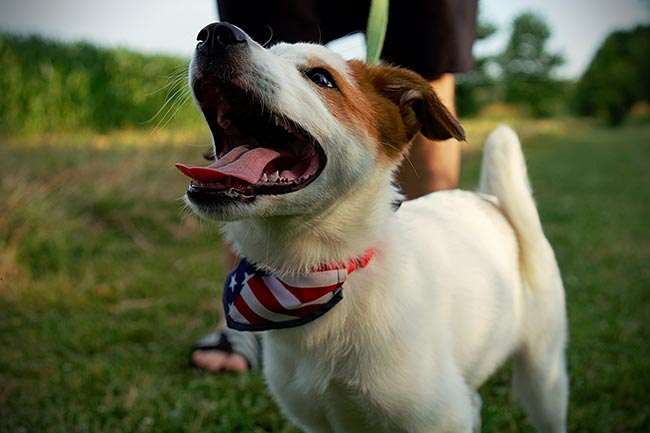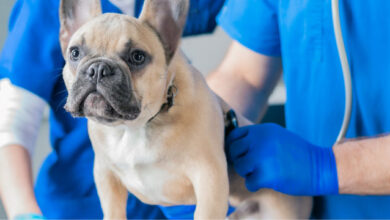
Dogs are playful and friendly animals that enjoy hanging out with people, other dogs, and toys. Deviations in behavior could signal a problem.
But what about panting? Is it normal behavior in canines?

Read More:
- Why Flat-faced Dogs Are At Higher Risk Of Obesity-related Issues
- What Are Your Options After You Find out Your Dog Has CHF
- Essential Oils and Your Pets: Pros and Cons
- Odds of Finding Lost Dogs: Will You Ever See Your Buddy Again?
- 10 Things You Should Keep Away from Your Dog
Panting is expected behavior if it is due to physical exertion, excitement, or warm temperatures. Panting is usually a response to something, is not strenuous, and is short-lived. If the dog pants for reasons other than these, there could be a problem. Your pooch could be perilously overheated, struggling with a chronic health issue, or has experienced a life-threatening trauma.
Read on and learn how to tell if your furry buddy is panting excessively and what you can do to help.
How can you tell if your dog is panting abnormally?
As we have already seen heavy breathing is not unusual behavior if your furry buddy is reacting to:
- Exercise
- A hot environment
- Excitement
But it could be hard to tell if a casual walk could amount to exercise that results in panting. Also, you may not know if the temperatures are too high. Often, your furry buddy could be excited about something, and you have no idea what it is.
So, how do you draw the line between normal and abnormal panting?
The key is in your pooch’s body language. If you suspect the panting is abnormal, observe the body language. If the dog is pinning the ears back, tucking the tail, shying away, and avoiding eye contact, it is a sign of stress. Your dog could be coping with an ailment, in pain, or struggling to breathe.
Other signs that could accompany abnormal dog panting include:
- Low energy
- Coughing
- An unusual tongue color
- Unusual feeding, drinking, or toileting.
- Shallow and fast breathing
- The tongue would curl upwards instead of drooping down.
- An outward stretched neck
What to do when you suspect something is wrong
Take your furry buddy to the nearest pet emergency service center. Let the vets examine your dog and treat him or rule out any issues.
Treatment for excessive dog panting depends on the cause. It could be as simple as taking a break to cool off and drink some water or complicated surgeries and long-term therapy. Here are some of the causes of abnormal panting and treatment.
Heatstroke
Unlike humans, sweating does not help dogs to regulate body temperature very much. Instead, dogs rely on panting. They exhale hot air and breathe in cool air. As they inhale, the air becomes cooler due to contact with the saliva on their tongues. During the warm months, this process might not be very effective in cooling down the dog. You should be extra cautious with your dog. Short snouted breeds like the French bulldogs, Boston terriers, Shih Tzus, and others experience this challenge more frequently.
If the dog’s temperature rises too high, he will not stop panting. If the temperature rises to dangerous levels, your dog could suffer a heat stroke.
Urgently take your furry buddy to the nearest pet emergency service facility. Heatstroke could be fatal in less than 15 minutes.
Poisoning and allergies
Poisoning and allergic reactions could also trigger abnormal panting. Your dog could have ingested a chemical used to control pests like rat poison or plants and foodstuff that trigger allergic reactions like chocolate.
Urgently seek help from the nearest pet emergency services facility.
Heart failure
Like humans, dogs too can suffer heart failure. There are many causes of heart failure. But one of the earliest symptoms of heart distress is abnormal panting.
If the heart is not functioning well, there will be less oxygenated blood flowing in the body. Your dog will pant excessively to compensate for the low oxygen levels.
In such a case, the abnormal panting would be accompanied by coughing, weakness, and signs of pain.
Once again, urgently seek help from the nearest pet emergency services facility.
Respiratory illness
Ailments affecting the respiratory system such as lung tumors, pneumonia, and laryngeal paralysis can trigger abnormal panting. Schedule an appointment with the vet and get your dog examined.
Cushing’s disease
Cushing’s disease is due to abnormal adrenal glands. The dog’s adrenal glands would produce too much cortisol resulting in various health issues such as diabetes, kidney damage, etc. Your furry buddy would have a pot-bellied appearance and pant, drink, and urinate abnormally.
Treatment of Cushing’s disease is usually by surgery.
Obesity
Obesity in canines is a growing problem in America. One of the earliest signs that your four-legged buddy is struggling to haul his weight is abnormal panting.
Treatment of obesity focuses on lifestyle changes regarding diet and exercise. It is often long-term and would involve you the most.
Final thoughts
To conclude, panting is normal behavior in dogs. But there are cases where it could be abnormal or triggered by a threatening issue. Observe your dog’s body language. In case of abnormal panting, seek help from qualified professionals.




